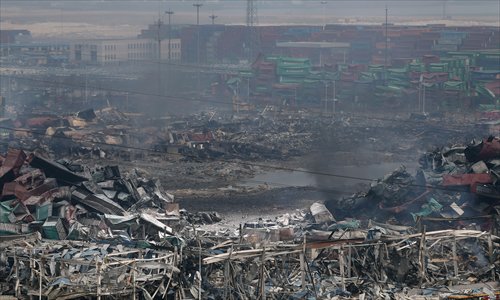HOME >> CHINA
After the fatal blasts, there are many questions but answers are rare
By Hu Qingyun in Tianjin Source:Global Times Published: 2015-8-23 20:38:01

Containers and buildings lie in ruins after the Tianjin explosion on August 12. Photo: Cui Meng/GT
"Have you seen any of my mates from the fire brigade in other hospitals?" a young firefighter asked me while sitting in his bed and waiting for some TV reporters to film him leaving the hospital.
As I remained silent, he turned his gaze to the television hanging on the wall and watched the latest live broadcast about the Tianjin warehouse blasts.
The 18-year-old started to tell me that he wanted to rejoin his team and fight against the fire again. Looking at his eyes, which were full of hope, I could not tell him that he is the only survivor from his brigade. All the other firefighters in his team were killed in the blasts or are still missing.
The only sound in the ward was the TV program praising the bravery of the firefighters that faced the blast and reporting the climbing death toll.
My two minutes of silence after he asked me about his friends were the most heart-breaking and frustrating moments of my career.
Like the ward, Tianjin's Binhai New Area was abnormally silent hours after two blasts ripped through the warm night air on August 12, killing more than 100 people.
On my way to the explosion site early on the morning of August 13, I was turned back by armed police officers, firefighters and soldiers some two kilometers away from the warehouse.
No reporters were allowed to get close to the site or even visit hospitals that afternoon. When we asked for an explanation, no one answered.
Officials seemed reluctant to answer reporters' questions from the very first press conference. "I don't know," "I'll find out more later," "It's my colleagues' responsibility," were popular excuses.
It is understandable that in the immediate aftermath of such a massive tragedy, the authorities need time to find out the causes and come up with long-term solutions. However, the silence of officials did not help calm down the city's panicked and traumatized citizens.
Almost everyone on Tianjin's streets was wearing protective breathing masks despite the government's assurance that the air was not tainted by the explosion. Many believed that downpours after the disaster were dangerous, despite the government saying that "raindrops did not affect any environmental supervision data or cause any problems."
Rumors about the cause of the disaster, the number of deaths and the background of the company that was running the warehouse had widely spread. The quieter officials were, the louder these rumors became.
Top officials, including the Premier, urged transparency after the incident and it was said that some Chinese officials must learn how to change their minds when handling emergency situations. Remaining silent only serves to accelerate the government's loss of credibility and the trust of its people.
I was finally able to sneak into the explosion site early on August 14. Taking shelter from the sun under a tree, a group of firefighters were eating meals or catching a quick nap before rushing back to put out the fire which was still burning near a mountain of containers some 300 meters away. No one was chatting. They were just staring at the fire.
Some 50 meters behind these firefighters, a young sanitary worker picked up a teddy bear that was lying on a patch of grass in front of some ruined houses. His lips moved as if he wanted to ask to whom it belonged. But he did not make any sound and put the toy into a garbage bag.
Outside a residential area located only about 620 meters from the explosion site, a couple who appeared to be in their 60s, asked me why no one told them there was a warehouse filled with dangerous chemicals close to their home.
"We spent 40 year of hard work to buy a house but no one told us anything. The government or anyone who was responsible needs to give answers," the couple said, pointing out the broken windows and holes torn in their block.
Before I left the city six days after the blast, many shops, restaurants and companies had reopened. Life continued but silence remained.
Newspaper headline: Deafening silence
Posted in: Society